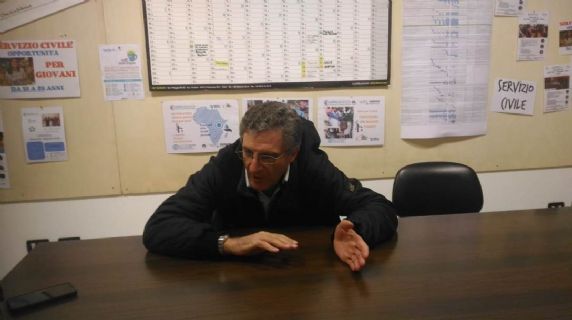Damiano Guzzetti, Bishop of Moroto, visited our office in Piacenza.
Damiano Guzzetti, bishop of Moroto since 2014, is in Italy for the participation in the Synod of Bishops dedicated to young people, held in October in the Vatican. During his stay he took the opportunity to move to Piacenza to greet the friends of Africa Mission-Cooperation and Development, the organization of Don Vittorione with which he collaborates in Karamoja. We took the opportunity to have a chat with him on the theme of the Synod and on the problems of young people, in Uganda as in Italy.
Bishop Damian, what was the central theme of the Synod of Bishops to which you recently attended?
This year's Synod was dedicated to young people: a theme very dear to the Pope, which reaffirmed the importance of involving boys and girls, listening to them truly, without prejudice and preconceptions. One aspect of the synod that should have been better taken care of is that of the origin of young people, because once again we have been too "occidental-centric" forgetting that most young people live in the South of the world. Obviously those living in Europe have different problems from their peers in Africa: there is dramatically the total lack of work and services, as the theme of exploitation is predominant. During the work there was much talk about the global economy, with the Pope reiterating his condemnation of a type of economy that puts profit before people and the environment. As for young people in Italy, I make my own the words of Enzo Bianchi, former Prior of the Bose community, who stressed the importance of putting a question in the hearts of young people, encouraging them to question the "meaning of life" and giving them tools to face a "gaseous" society, which bombards them with stimuli and messages that are often empty, making them lose the sense of the value of fidelity and of continuity.
You have been in Uganda since 1986 and have lived in the African country almost permanently for 30 years. What are your main challenges in Karamoja?
Start immediately saying that in Moroto the changes taking place are many and some of them are extremely problematic. First of all I want to point out the phenomenon of exploitation of local laborers that began to occur immediately after the discovery of the minerals present in the subsoil. In this case we are trying to create a cooperative mentality that leads to the rejection of this exploitation, but given the poverty of the territory is not an easy task. Another dramatically current aspect is that of climate change: intense drought phenomena alternated with years in which the rains are too intense (or fall in the wrong period) have brought local agriculture to its knees, which is in any case subsistence. People lose motivation in agriculture and we are seeing increasing domestic immigration to escape this situation. On the contrary, some people recycle it by selling charcoal, cutting however ten-year trees that contributed to the preservation of the already extremely fragile ecosystem. Reforestation projects are necessary and at the same time it is necessary to make the population understand the importance of the presence of trees. Finally, we are facing the problem of alcoholism, a real scourge that involves serious social and health consequences. Diseases related to alcohol abuse have increased exponentially and the situation seems to worsen from year to year: we work closely with the population, explaining the risks of this behavior and trying to give them alternatives.
What does a reality like that of Africa Mission-Cooperation and Development mean for this region?
AMCS plays an important role in this region of Uganda: the association has been able to evolve, adapt to changes and learn how to respond to the challenges that were presented. From an emergency situation such as that of the serious famine of 1979, which the founder Vittorio Pastori denounced, to a more stable situation but in any case of very serious poverty, Africa Mission has become a point of reference for many people in the area, also creating jobs, in an attempt to dismantle the "mentality of dependence" created in a population subject to endemic crises. Even today in Karamoja many remember Don Vittorio with gratitude for the commitment that he lavished until his death and this also helps a lot in relations with local institutions. The suggestion that I would like to give to AMCS's friends is to continue on the path taken, seizing every opportunity to give work to the people of Karamoja and thus helping them to grow in the sense of responsibility and in the ability to organize and manage activities and take on commitments and responsibilities working.



